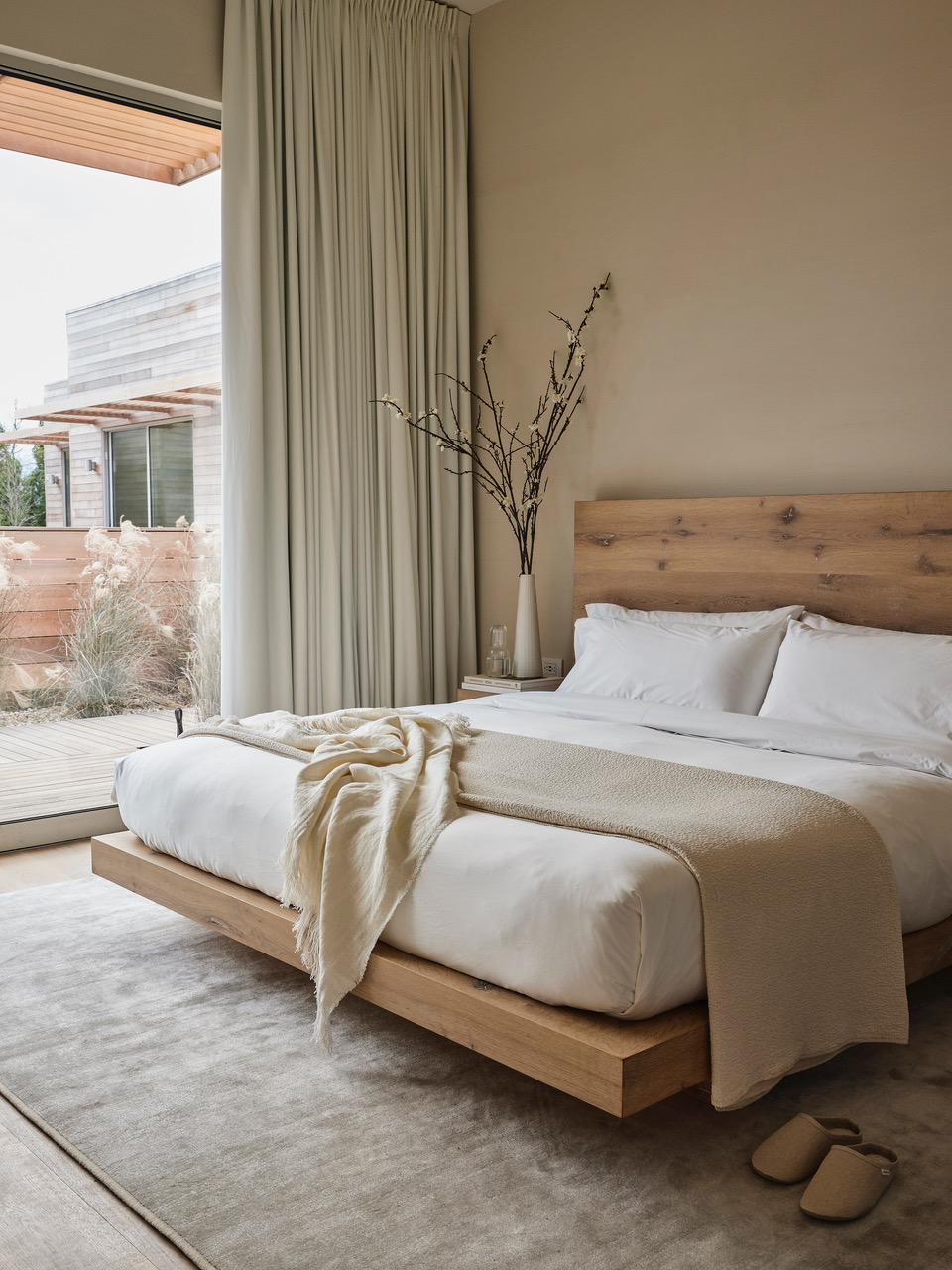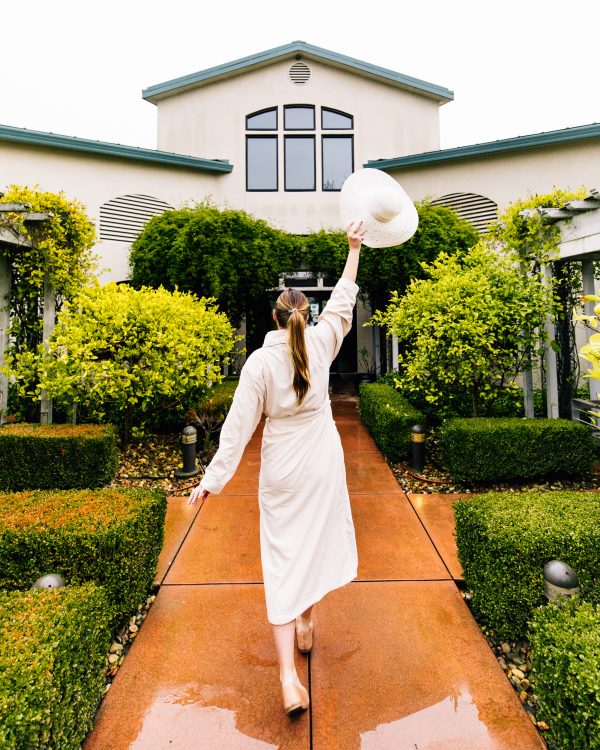Last updated February 5, 2024
One of the few trips I was able to take in 2020 before the pandemic shut us down was to Shou Sugi Ban House in Watermill, New York. It was a cold, clear day in mid-January when I arrived at this peaceful haven.
The cold weather provided the perfect excuse to hole up in my stunning “guest studio.” With the fireplace roaring, wearing my luxe robe and gorgeous organic slippers, I brewed a cup of tea and sat down to write in the beautiful journal they provided for me.



My afternoon was filled with a sound bath, spa treatment and visit to the far infrared sauna and hot tub. This perfect day was capped off by an off-the-charts meal. This was followed by a bath drawn for me in my authentic Japanese Ofuro tub with the property’s seasonal soak.
I literally floated off to sleep and dreamed of my return!
Sallie: What was your motivation to create Shou Sugi Ban House?
Amy Cherry-Abitbol, Co-Founder & CEO, Shou Sugi Ban House: Wellness has always been a part of my life. Though career-wise I come from outside the wellness industry, I approached this project with a fresh perspective. I rely heavily on my own intuition to do what feels right.
For this launch, I focused on integrating my own experiences and research into wellness, nutrition, longevity science and global healing modalities. I also incorporated my appreciation for design and sustainability to bring them all together in a unique way.



In particular, I’m intrigued by the research and discoveries surrounding telomeres and how external lifestyle factors can alter one’s DNA.
Specifically, studies indicating that good nutrition, fitness and reduced stress can actually retard (and in fact, may lengthen) the fraying of your telomeres (the ends of one’s chromosome strands) resulting in increased health and longevity.
These findings validate a wholesome approach to mind, body, spirit and inspired Shou Sugi Ban House’s approach and programming.



Having spent time in the Hamptons since college and been a full-time resident for over 20 years, I recognized the need for a destination like this. The Hamptons offers a perfect setting for this experience, surrounded by the healing powers of the ocean, beaches, open skies and sprawling farms.
When the property became available, we seized the opportunity to create a first of its kind wellness retreat and spa here.
Sallie: I know you lived in Japan for several years. What did you love most about Japan and how have you translated that into what Shou Sugi Ban House has to offer?
Amy: I have always been inspired by the Japanese culture, aesthetics and design. I’m particularly intrigued by the Japanese principle of “wabi-sabi,” which celebrates beauty in what’s natural, even that which is imperfect and impermanent.
The simplicity of this approach was the starting point for my vision of what Shou Sugi Ban House would become.

The principle of wabi-sabi informed the design of the property and the programs that we have implemented, as well as the materials and ingredients we use.
It speaks to an understated elegance in the interior design which we further enhanced with a tranquil and calming color palette of bisques and natural hues, organic fabrics and artisan-crafted furniture.

For the grounds, this translated to incorporating the pebbled pathways, a meditation bench, a gathering lawn, a cherry blossom orchard, a fire lounge, and several discovery moments for mindful, contemplative reflection.
This also brought an added focus on sustainability and organic, naturally harvested ingredients for our culinary program and spa and healing arts offerings, including many grown in our on-site gardens.
Sallie: What are a few of your favorite “wellness rituals” that guests can experience?
Amy: My favorite wellness ritual is a simple, meditative morning beach walk which is the perfect way to start the day and clear the mind.



Hydrotherapy is a very important complement to our therapies and treatments. Our hydrotherapy circuit is now available as a private experience for our guests, and we also offer a Watsu massage in a private, heated pool of structured salt water which is a beautiful way to experience aquatic massage for decompression and improved flexibility.
We have recently expanded our spa and wellness offerings and have added new and unique experiences and workshops. Three of my favorites are Intuitive Painting, Radical Self-care, our Plant Spirit Journey.
Our experiential Intuitive Painting workshop guides guests to inspire their creative expression through the language of color, shape, and texture – and it’s quickly become very popular among our guests.


Our new Radical Self-care workshop explores the four pillars of self-care and provides meditations and practical tools to reclaim mind and body.
And, lastly, our Plant Spirit Journey allows guests to experience the healing power of plants through herbal allies – like rose, mugwort, nettle, cacao, dandelion, and chamomile – and our guide provides seasonal recommendations for each individual’s needs.
Sallie: Tell us three things about Shou Sugi Ban House that most people don’t know.

Amy: The eight-ton Buddha that sits in front of the Shou Sugi Ban House was on property when we purchased the land, which used to house a sculpture garden. We invited monks from a local monastery to come and lead the team in a blessing before we officially opened.
Shou Sugi Ban House’s founding team was an all-female team—including our head of operations, program manager, creative director, architect, landscape designer, as well as myself and my co-founder.
Many of the vegetables, herbs, nuts, berries, and flowers used in our culinary offerings are grown on-site in Shou Sugi Ban House’s organic gardens.
Sallie: Your culinary menus are created by Michelin-starred chef Mads Refslund, a co-founder of Noma in Denmark. How does the Japanese and Danish influence meld and what kind of dishes might we dine on?




Amy: The Shou Sugi Ban House culinary philosophy is based on a hyper-seasonal, farm-to-table approach rooted in the belief that true health is grounded in nature and food is medicine.
Our menus, designed in collaboration with Michelin-starred chef Mads Refslund, are Nordic-inspired with Japanese influences while always being mindful of the property’s focus on sustainability and local elements.

Each of our plant-rich meals features locally sourced ingredients in innovative preparations of organic whole grains, fresh fruits, leafy greens and root vegetables as well as freshwater fish, shellfish, and poultry, and each meal is designed to cleanse, heal and sustain our guests.
Almost all of our ingredients are locally grown and raised, through farms and purveyors we collaborate with as well as an abundance of vegetables, herbs, nuts, berries and flowers grown in Shou Sugi Ban House’s on-site organic gardens.

The culinary team also forages on the grounds of the property for wild ingredients, such as young spruce tips, cattail shoots and stalks, and birch tree sap.



Sallie: Please share a bit about your spa menu and the concept behind the “tonic pairings.”
Amy: Shou Sugi Ban Spa’s extensive spa and healing arts offerings focus on specially crafted therapies and signature treatments consisting of pure, plant-based botanical products that cleanse, invigorate and protect.
Spa guests can schedule spa rituals and healing arts treatments and come for a few hours or they can select from several overnight retreat formats, like our Custom Stay, which allows to guests work with our team to create a unique itinerary of immersive experiences and treatments.


Our tonic pairings are herbal elixirs created to nourish the body and remove any excess impurities released during a massage, facial, or body treatment.
As an example, each of our signature massages was designed as a ritual that taps into all of the senses to heighten the experience. As part of these rituals, we recommend hydrotherapy protocols for pre and post-treatment and also offer a specific tonic after each massage.
We suggest beginning our Edge of the Woods massage with a pre-treatment aromatic steam to soften and hydrate tissues and suggest a post-treatment series of warm and cold plunges in our outdoor hydrotherapy circuit to soothe and tonify.
Sallie: I believe that sleep is essential to a good stay anywhere I go. What are some things that Shou Sugi Ban House does to ensure a guest has a good night’s sleep?



Amy: Each of our guest studios has organic mattresses, tea kettles and a selection of our signature herbal teas; ambient music that can be controlled; and a set of tuning forks with instructions on how to use them, which can be especially calming before bed.
At the end of each day, our housemade herbal “seasonal soaks” are placed in each guest studio, to encourage a nightly bath to induce restful sleep.
Sallie: As a busy founder/owner, what helps you maintain your wellbeing?
Amy: I follow the guidelines of a holistic doctor and spend as much time as possible outside – and of course, I exercise, meditate, and eat well (most of the time)—but I find that being fully immersed in the development and operations of Shou Sugi Ban House is the best way for me to practice self-care.

I love to take care of the property and I survey the buildings and the grounds practically every day to ensure that they are perfectly presented and manicured and that the teas, snacks and fruit are always available and fresh for our guests.
I also enjoy researching new programs and offerings and find that to be a fascinating and rewarding experience.
Amy Cherry-Abitbol, Co-Founder & CEO, Shou Sugi Ban House
Amy Cherry-Abitbol is the creative force behind Shou Sugi Ban House, the first boutique wellness destination in the Hamptons. Guided by a belief that each person walks a unique path to wholeness, she and her business partner purchased the property in 2015 to create a sanctuary outside of the every day and establish an innovative experience that blends global wellness philosophies with state-of-the-art practices.
Amy lived in Japan for many years and Shou Sugi Ban House reflects her lifelong connection to Japanese culture, along with her appreciation for minimalism and the healing properties of the natural world.
Inspired by the beauty and light of the Hamptons, where she has lived for the past two decades, Amy created Shou Sugi Ban House as a multilayered experience, with design that embodies quiet luxury and treatments and programming that are tranquil and transcendent.
Following a successful career as an attorney specializing in corporate law and government affairs at firms in both the United States and Japan, Amy became a co-founding partner of Abitbol & Cherry LLP.
A graduate of Barnard College and the University of Chicago Law School, Amy attended Harvard Business School’s “New Paths” Executive Education program in 2014 for women seeking to change careers and explore new opportunities. This experience became the catalyst for her inspired transition to combine her interests in health, wellness and design and create Shou Sugi Ban House.

About Vacayou
At Vacayou [pronounced VACAY – YOU], we believe that travel has the power to change lives. The power to revive, rejuvenate and redirect your inner wellness warrior. And that’s why we’re here. Vacayou brings the world of wellness travel to you!
No matter how far or how adventurous, our team scours the globe to curate the best in wellness travel. But the booking process can often be time-consuming and complicated. We’ve made it much easier for you to search, discover, and book wellness and active vacations. With Vacayou’s Instant Book, your dream wellness getaway is now just one click away.
Start the trip of your lifetime today, with Vacayou. We are here to help create a healthier global community through wellness and active travel.
To keep up with the latest wellness trends and experiences, be sure to subscribe to our newsletter.

